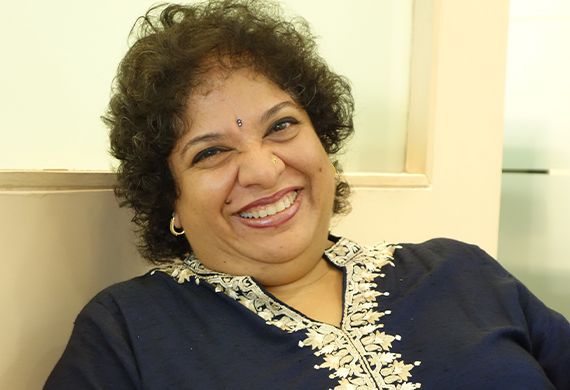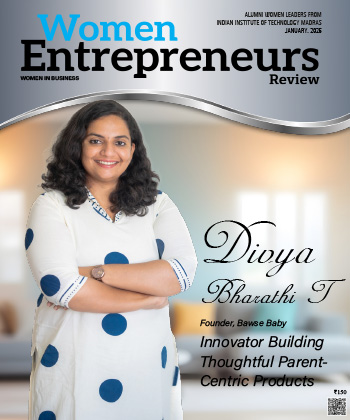
Shattering Glass Ceilings: How Women Are Redefining Leadership in Travel
By: Mona Cheriyan, President & Group Head HR, Thomas Cook (India) & SOTC Travel
Mona Cheriyan is an accomplished HR leader with nearly 40 years of experience across various industries. She specializes in leadership development, talent management, D&I, and performance management. Mona is passionate about mentoring women, shaping global HR strategies, and advancing diversity and inclusion in corporate India.
In an insightful interaction with Women Entrepreneurs Review Magazine, Mona shares her insights on the future of talent acquisition and retention in the travel and tourism space. Showcasing strategies and approaches adopted by Thomas Cook, she talks about cultivating leadership styles that resonates across borders while also discussing strategies for empowering women in leadership. Mona explores unconventional approaches to attract & nurture talent in uncertain times, while simplifying how to align long-term and short-term goals in the travel space.
To know more, read the article below.
In your opinion which disruptions will shape the future of talent acquisition and retention? What unconventional approaches are you exploring to attract and nurture talent that thrives in uncertainty?
As a CHRO in the travel and tourism industry, I anticipate that disruptions will significantly impact talent acquisition and retention. As the leading organization in our industry, we follow awell planned approach to attract and nurture talent. Our endeavor is to attract talent that is comfortable to work in both physical and virtual environments.
Given the high amount of skills obsolescence and the rapid pace of technological change, we require employees to continually update their skills, making ongoing learning and development crucial. One of our key selection criteria is to look for candidates who have a drive to upskill themselves. We stress on internal mobility and upskilling. We focus on developing internal talent through upskilling and reskilling programs, enabling employees to adapt to changing job requirements.
The industry's global nature demands a diverse workforce. We are prioritizing inclusive hiring practices and have promoted a culture that values diversity. The rise of the gig economy requires us to adapt to flexible work arrangements and non-traditional employment models.
We believe in employee advocacy and referrals. We encourage employees to share their experiences and refer candidates through social media and other channels. We also encourage partnerships with non-traditional education providers and collaborate with online education platforms, coding boot camps, and other non-traditional providers to access untapped talent.
In a sector deeply influenced by fluctuating global trends and diverse cultural landscapes, how do you cultivate a leadership style that resonates across borders? Can you share an example of the same.
At the Thomas Cook India Group, we are a truly global company - not only in the way we work, but in the fact that our business is providing outstanding travel experiences to our global customers.
In order to develop a corporate inclusive culture across geographies, it was important to define a structure which helped drive various strategic initiatives, to ensure alignment of thought across our various geographies and cultures. We have employees of over 18 nationalities and therefore the first step was to develop relationships and form bonds with key stakeholders in every region.
My keen understanding of local customs, norms, and values helped to navigate complex cultural dynamics and adjust leadership approaches to suit different cultural contexts while still protecting our defined corporate values.
Our global policies allow seamless coordination across the Thomas Cook India Group. Our standardization of processes, controls and policies ensure alignment of thought across our various geographies while still ensuring cultural nuances of the region are maintained.
With more gig work, remote roles, and hybrid teams, how are you adapting your workforce model to attract top talent while staying competitive?
We have worked with hybrid teams for a long time. While we have roles which are traditional workforce structures like those in the sales, operations, product development and support space, we also have roles which are in the tour management space and some sales roles which are gig roles. We have a “feet on street” salesforce which supplements our traditional sales workforce structure. In addition, over 350 tour managers have flexible contracts with us. They are experts with a great knowledge of destinations and the ability to deal with our demanding customers.
We add to our workforce based on the business requirement which is seasonal. During peak times and special projects, we add additional teams to our existing workforce. This requires us to train and develop a huge potential gig workforce which is available on demand. We therefore conduct year-round training programs to develop potential gig workers with flexible contracts.
Balancing short-term business demands with long-term cultural transformation can be a paradox for HR leaders. How do you reconcile these competing priorities without compromising the essence of your organization’s identity?
We are committed to maintaining our corporate culture. While we have micro cultures in each business which we encourage, we ensure training and orientation programmes for our new joinees in both our employees and gig workers to ensure seamless integration.
We have focus group discussions and culture labs which are designed to communicate our values and ethos to the teams across our geographies.
Our reward schemes focus on rewarding the behavior we value and this helps in socializing the same with our employees. Being an organization which is committed to learning and development as a part of our culture, every program that we deliver reiterates the essence of our core values and the same is communicated in all our initiatives across our global teams.
Women often thrive as frontline workers in the travel and tourism industry but are underrepresented them in decision-making roles. What strategies have you implemented to dismantle systemic barriers and enable women to shape the strategic direction of your group companies?
We are committed to having an inclusive environment not only from a gender perspective.
Allyship Training is a program we deliver to all employees which helps address unconscious bias for all employees, focusing on recognizing and overcoming biases that hinder growth.
We practice inclusive hiring practices where we consciously do not allow hiring processes which show bias against women for any roles.
We have a first-time manager and senior managers program which stresses on inclusive leadership development which provides women leaders with intensive training, coaching, and mentoring to prepare them for senior roles.
Our focus on implementing flexible work arrangements, enables women to balance work and family responsibilities more effectively. In addition, we have reward mechanisms for leaders who promote inclusivity at the workplace, we, have a focused employee resource groups called WoW (Women of Worth) for women from diverse backgrounds, providing a platform for support and networking. We encourage women leaders to participate in industry events, conferences, and media platforms, amplifying their voices and promoting their expertise.
By implementing these unconventional strategies, we have created a more inclusive environment that enables women to thrive and shape the strategic direction of our group companies.
Most Viewed
- 1 Women's Health Startup HerMD Closing Doors Amid Industry Challenges
- 2 5 Famous Women in Indian Armed Forces
- 3 Saudi Women No longer Require Male Permission for Clothing Choices, says Prince MbS
- 4 Kolkata Medtech Startup Innovodigm Raises Rs 5.5 Crore Seed Funding Led by IAN Group
- 5 Yamunanagar's Kashish Kalra Honoured after Securing 111th Rank in UPSC Civil Services Exam
- 6 Madurai Appoints Its First Woman Corporation Head
- 7 IAS Vijayalakshmi Bidari Appointed as the new Nagpur Divisional Commissioner
- 8 American Entrepreneur Lucy Guo Overtakes T Swift to become Youngest Female Billionaire
- 9 ICC Women's World Cup 2025 Trophy Showcased at Indore's Holkar Stadium
- 10 Aparna Saxena's Beauty Venture AntiNorm Launches in India
- 11 Vidya Nataraj Co-Founded BlueStone Jewellery & Lifestyle files IPO
- 12 5 Women Freedom Fighters of India
- 13 Dr. G Krishnapriya appointed as CEO for Trichy
- 14 M3M & Sirona Partner to Introduce Menstrual Hygiene Vending Machines in 15 Locations
- 15 Punjab Govt launches SHE Cohort 3.0 Supporting Tech-led Women Startups
- 16 Indian origin Lawyer, Sweena Pannu appointed as the US New Superior Court Judge
- 17 The Aurora Tech Award recognizes 4 Indian Women-led Startups
- 18 Kerala's Republic Day parade featured an all-female tableau
- 19 Manisha Kabbur Becomes Karnataka's First Woman International Karate Coach
- 20 Director K. S. Ravikumar's Daughter Maalica Ravikumar Launches Life Coaching Company 'Evergrowth Academy' for Women
- 21 Leezu's Raises Pre-Seed Funding to Accelerate Growth in Sexual Wellness Industry
- 22 Sattu: Super-easy summer drink for PCOS gut healing
- 23 Swathi Nelabhatla creates Sitha App, India's First Women-Exclusive Gig Platform
- 24 7 Timeless Female Kathak Dancers & their Iconic Legacies
- 25 Meet 7 Iconic Women Architects of Modern India & their Most Impactful Work
- 26 This Woman-led Insuretech Startup is Helping Bridge the Education Financing Gap in India
- 27 Women Leaders Share Lessons Learnt from India Women's WC Win
- 28 5 Enterprising Women Founders Powering Singapore's Tech & Innovation Landscape
- 29 4 Women. 4 Stories. One Vision for Smarter, Stronger Healthcare
- 30 Global Gender Gap Narrows to 68.8%, But Full Equality 123 Years Away: WEF Report 2025
- 31 Changemakers: 7 Women Entrepreneurs Taking the Make in India Movement Forward
- 32 Meet Lucy Guo, The Youngest Self-Made Female Billionaire Disrupting Tech
- 33 How Women are Driving India's Festive Online Shopping Surge






